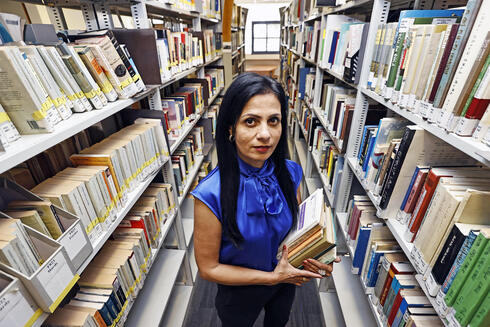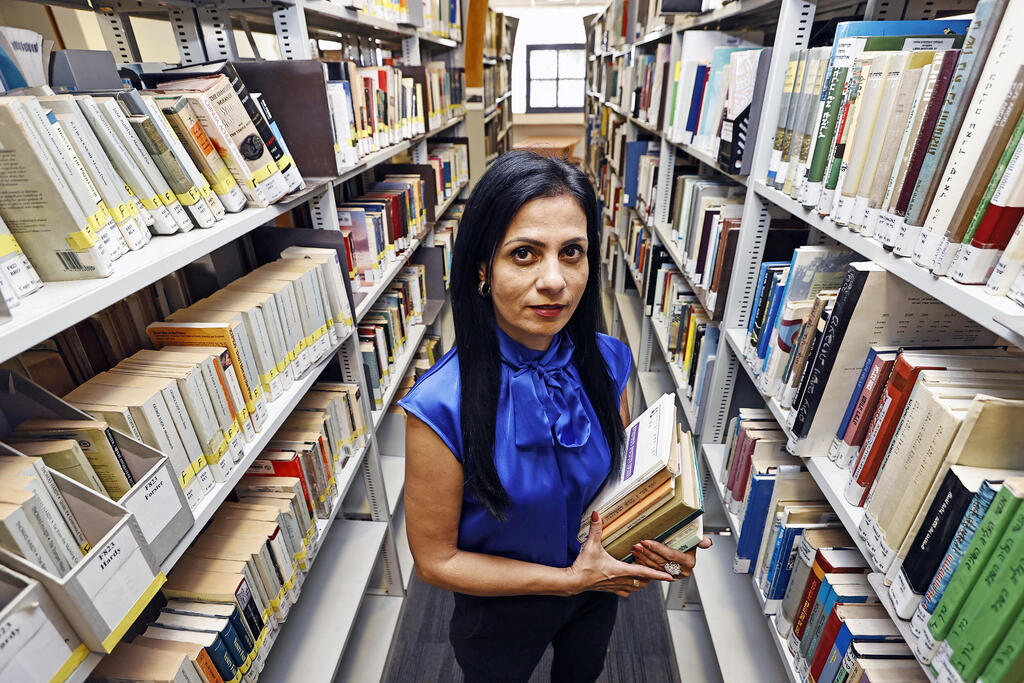
Hamas set terrible precedent in use of sexual violence as tool of terrorism
"The general picture is of a systematic use of sexual assault during the Hamas attack. It is systematic in the sense that it could be identified in all the main arenas where Hamas attacked and you could see repeating patterns,” says Prof. Yifat Bitton, who has been working tirelessly to expose the alarming prevalence of sexual violence in the 7/10 attack
In the aftermath of Hamas’ murderous attack on 7/10, Professor Yifat Bitton has emerged as a formidable advocate determined to expose the alarming prevalence of sexual assaults committed by the terrorists.
Bitton is the chairwoman of the Association of Colleges Heads in Israel, president of Achva Academic College, and is the founder of Tmura—The Israeli Anti-discrimination Center, which advocates for the rights of women who have suffered abuse. She argues that this dark episode stands as an unprecedented milestone in the history of terrorism, particularly within Western nations. Despite her persistent efforts to bring attention to this issue, she notes a global reluctance, attributing it to political bias and antisemitism. While President Biden's acknowledgment marked progress, Bitton insists that international recognition remains insufficient.
You are one of the leading figures in the fight for global recognition of sexual assaults on 7/10. What is the overall picture of these assaults?
"The general picture is of a systematic use of sexual assault during the Hamas attack. It is systematic in the sense that it could be identified in all the main arenas where Hamas attacked and you could see repeating patterns across the various arenas and numbers that give no reason to think that this was a random act. And we have evidence of this from dead bodies, as well as a number of eyewitness accounts. Most of the evidence concerns women, but there is also evidence of harm to men, especially genital mutilation."
Is there precedent for sexual assault as a weapon of terrorism?
"There are far fewer precedents for this in Western countries; Bosnia in the 1990s and Ukraine, but not at such a scale and in one day. Israel is a terrible milestone on the map of the hell of terrorism and the use of sexual assault as a tool of terrorism."
How many survivors of Hamas’ sexual violence remain?
"I don't know how many. I just know for sure that there are survivors and that we must be careful not to make any move that could harm them and that control should be left in their hands. For example, I read that the police require hospitals to report such cases that they treated, and I think that victims should be allowed to decide and not be pressured to testify."
How do you understand the reaction of the world and has there been a change in it?
"Unwillingness to listen to Israeli women victims because they are on the occupying side is simplistic and shocking. In other cases when there was news of sexual abuse, there was an immediate mobilization of the international community. We must remember that this isn’t some favor we are asking for - there are organizations that were set up to do this job. This denial and loss of direction is due to political reasons, and I also see elements of hatred of Israel and antisemitism. There was a deafening silence because as soon as these organizations did not condemn [the sexual violence], it enabled the wave of hatred towards Israel."
What don’t they understand in the West?
"I participated in a Jewish community event in the United States. The community invited aid organizations that combat sexual assault that it works with and donates to. A representative of one of the organizations responded that they prefer to participate in events where there can be a discussion about the roots of such violence. In other words, they said that if you want to talk about sexual violence in 7/10, they will do so only if they can talk about the occupation. This is a progressive argument that is completely regressive, where rape can only be discussed if the reasons for rape are also discussed. It is unimaginable that an organization working in this field would write something like this."
You met with President Biden on this matter and shared a letter with him from the Civilian Commission to Investigate Hamas’ Crimes Against Women and Children. Did that change the global position?
"In the first statement the President gave when he was here, he talked about rape. It changed the face of things a lot. But we are still completely behind if we compare it to the recognition given to similar acts that came to the attention of the world."
The question is whether what happened here is a precedent for terrorism including rape?
"I think so, absolutely. There is a chance that there have already been terrorist attacks like this and either they weren't discovered or they weren't publicized."
Would you currently go do a doctorate or post-doctorate at a university in the United States?
"I would. The question is which universities are willing to host Israeli researchers at the level that they previously did. This is something that is critical to the development of the Israeli academy - the last thing we need is for Israeli academia to remain within its borders, which would be an additional price that we cannot pay."
As someone who did a post-doctorate at Harvard, what do you think of the positions of the President Prof. Claudine Gay?
"Gay's academic achievements are minor. I strongly believe in the principle of giving real opportunities for those from a background with few opportunities and have impressive proven abilities to break through even if they are not at the top of the list. But, of course, the intention was not to bring people who have not recorded impressive academic achievements and put them at the top."
You lost two relatives on 7/10. How did the personal loss affect you?
"My loss quickly drew me into action, to make sure I was using my ability to fight. In the end, I focused on raising awareness and recognition of the sexual attacks."
Israeli universities and colleges officially opened the school year on Sunday after a long delay due to the ongoing war in Gaza.
"We had to open,” said Bitton. “Is this something we are doing with a whole heart? Maybe with a whole head but with a broken and very heavy heart. We postponed the opening again and again to the point where it was clear to us that if we continued to postpone, we would not be able to make it through the year with all the dire consequences for the economy and national morale. But my heart is completely with the IDF reservists and their spouses."
Will the war increase the gaps between students from different socioeconomic backgrounds?
"Every possible study shows, and as recently proved by the coronavirus, that wars and crises always deepen gaps between the rich and poor, center and periphery, women and men. So I fear that this is the direction we are heading in. Most students from the first generation of higher education and from the lowest socioeconomic groups attend colleges, and their resistance to extreme changes of this kind is lower.
"I have a student from the south, both of whose parents are on leave without pay and he has a pregnant partner. He was wounded in Gaza and returned to the reserves because he is worried that he is the only breadwinner in the house. So the risk of such a student, with such low financial resilience, to drop out of school is very high. Colleges have fewer resources for assistance for their students. We’re not the Technion.”
Do you feel that it's a hopeless battle?
"No, no. This student will go back to school, and I will do everything to ensure he graduates. He will receive assistance from the emergency fund that I was able to raise with my meager means and after he graduates, his son will no longer be a first generation, and there will be no danger that his father will be put on leave without pay even if he lives in the south."
First published: 16:02, 31.12.23















